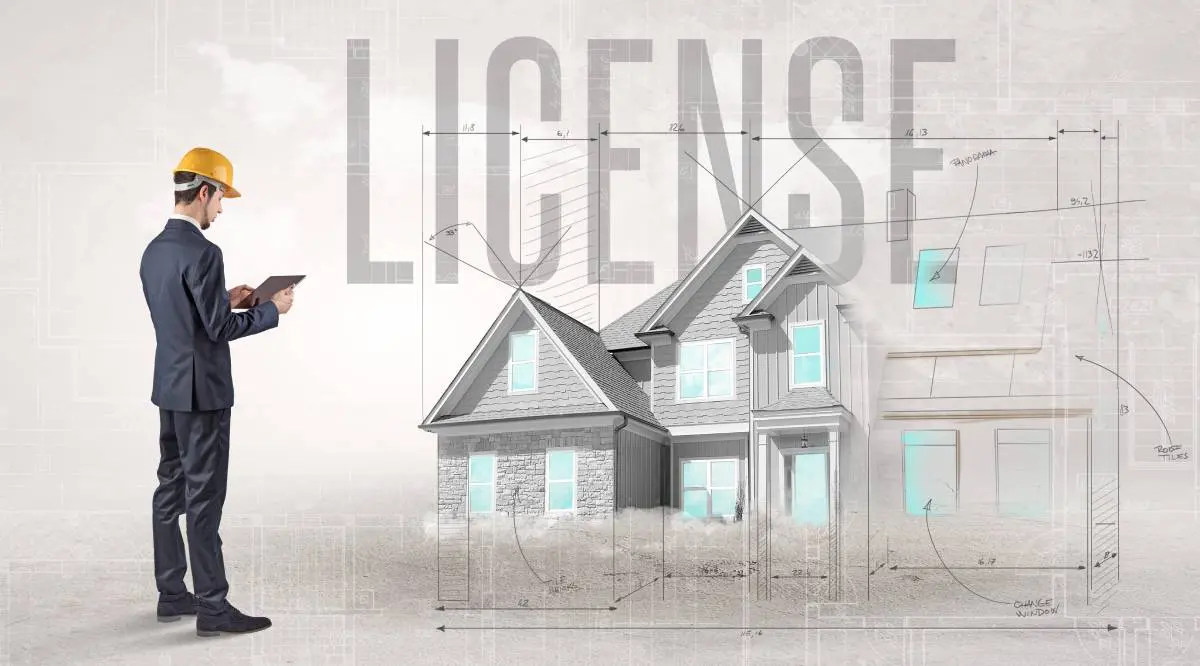Table of Contents
- What States Do Not Require a Roofing License?
- Common Roofing License Requirements Across States
- State-by-State Roofing License Requirements
- How Long Does It Take to Get a Roofing License?
- How to Get a Roofing License: Step-by-Step
- Additional Resources for Roofing Contractors
- Can You Transfer a Roofing License Between States?
- Do Roofing Subcontractors Need a License?
- Licensing Recap: What Roofing Contractors Should Know
Roofing license requirements vary from state to state in the U.S., with some states enforcing strict exams and experience criteria, while others require only minimal registration or none at all. Understanding these variations is a must for contractors operating legally and competitively, especially in heavily regulated states (Florida, California, and Illinois) or in less-regulated states (Texas, Colorado, and Indiana).

Key Points
- Only a handful of U.S. states, including Texas, Colorado, and Indiana, allow roofing contractors to operate without a license.
- License requirements commonly include experience, trade exams, business registration, and insurance coverage.
- Multiple states, including Florida, California, and Illinois, have state-specific licenses with defined pathways and application processes.
- Differences in license thresholds, such as job cost minimums or project type, can determine whether a license is required.
What States Do Not Require a Roofing License?
While most U.S. states require a license to perform residential or commercial roofing work, a few states are more lenient, either requiring no license at all or minimal registration.
States where a roofer’s license isn’t required at the state level include:
- Wyoming
- Indiana
- Kansas
- Texas
- Colorado
- Missouri
However, while the states may not require a license at the state level, local jurisdictions may have their own permitting or registration requirements. Additionally, in some cases, state-level registration is still required. For example, roofers in Kansas must register with the Attorney General’s Office to operate legally.
Even in states without a license requirement, many contractors still obtain certification or insurance to increase credibility and protect their business.
Common Roofing License Requirements Across States
Most U.S. states have roofing license requirements that fall into similar categories, even if the application processes vary. Understanding these common criteria helps contractors prepare, especially when operating in multiple jurisdictions.
- Experience: Many states require two to four years of hands-on roofing experience. In many cases, this must be documented and verified by an employer or licensing authority. Some states, like California and Florida, expect at least one year of supervisory or foreman-level experience.
- Examinations: Roofing license applicants are typically required to pass at least one exam. Most states test two areas:
- Trade Knowledge: Materials, tools, installation methods, safety practices.
- Business and Law: Contracts, liens, insurance, labor laws, and financial management.
- Insurance and Bonding: General liability insurance is often mandatory, with specific minimum coverage requirements. Workers’ compensation may also be required if employees are involved. Several states (e.g., California) also require contractor bonds as a condition of licensure.
- Registration and Fees: Most states charge application, exam, and processing fees. Applicants also undergo background checks or fingerprinting in some states.
- Renewals and CE: Licenses must typically be renewed annually or biennially. Some states (e.g., Florida) require continuing education for renewal eligibility.
State-by-State Roofing License Requirements
Roofing license requirements not only vary by state but also in their complexity and enforcement. Some states, like Florida and California, maintain rigorous statewide licensing systems with formal exams and background checks, while others rely on more basic registration requirements. Below is a breakdown of notable licensing requirements in key states across the U.S.
Florida Roofing License Requirements
To get a Florida roofing license, contractors must apply through the Florida Department of Business and Professional Regulation (DBPR). The Florida roofing license requirements include passing a two-part exam, documenting experience, undergoing a background check, and showing proof of insurance.
The full roofing contractor license Florida requirements also include submitting a credit report and providing fingerprints for background screening. In total, applicants must:
- Have four years of experience, one as a foreman
- Undergo a credit report
- Complete fingerprinting and background checks
- Obtain insurance, including liability and workers’ compensation
For a more detailed breakdown of the process and requirements, see our full article on the Florida roofing license.
California
In California, roofers are required to get a C-39 Roofing License through the Contractors State License Board (CSLB). In addition to completing an exam, other requirements for roofing licenses in California include:
- Four years of journeyman-level experience
- Fingerprinting and background checks
- Proof of insurance
- Contractor bond
Illinois
The Illinois roofing license is issued by the Department of Financial and Professional Regulation (IDFPR). Like several other states, an exam is required to obtain licensure, which includes multiple types:
- Commercial
- Residential
- Unlimited (both commercial and residential)
Contractors and consumers can verify credentials through the official Illinois roofing license lookup tool on the IDFPR website.
Texas
Do roofers need a license in Texas? Not at the state level. However, voluntary registration is available through the Roofing Contractors Association of Texas (RCAT). Additionally, certain jurisdictions may require permits or insurance, and many roofers in Texas choose to obtain certification, even though it’s unnecessary, to improve credibility and trust.
Arizona
Arizona requires roofers to obtain a CR-42 or R-42 license, available through the Arizona Registrar of Contractors (ROC). Successful completion of necessary exams is required to obtain licensure.
Georgia
A roofing license is not required at the state level in Georgia, but a general contractor license may be required for large-scale projects. Additionally, local licenses may apply.
North Carolina
North Carolina requires roofers completing jobs over $30,000 to obtain a license. This license, classified as a Building or Specialty Contractor license, is issued by the North Carolina Licensing Board for General Contractors.
South Carolina
South Carolina, much like North Carolina, has a threshold that, once surpassed, requires contractors to obtain a license. The threshold is much lower, requiring roofers to have a license for jobs valued at over $5,000. The South Carolina Contractor’s Licensing Board issues this license.
Nevada
Roofing licenses, classified as C-15 (Roofing and Siding) licenses, are required across the board for Nevada roofers. The Nevada State Contractors Board issues these licenses.
New York
New York doesn’t have a specific state license requirement. However, New York City and other local areas may require registration or specific permits for roofing jobs.
New Jersey
In New Jersey, no specific licenses for roofing are required, but the state does require roofers to register as a Home Improvement Contractor.
Oregon
Licensure is required in Oregon, obtainable through the Oregon Construction Contractors Board (CCB). Roofers seeking licensure in this state must complete training and pass an exam.
Washington
In Washington state, a roofing license is required through contractor registration. This is available through the Washington State Department of Labor and Industries.
Ohio
In Ohio, roofers don’t need a state license unless they’re working on commercial projects. However, local licensing is often required in specific cities.
Pennsylvania
Pennsylvania doesn’t require a state roofing license, but much like New Jersey, it stipulates that roofers must register with the Attorney General’s Office as home improvement contractors.
Massachusetts
Massachusetts roofers must be registered as a Home Improvement Contractor (HIC) at the Massachusetts Office of Consumer Affairs and Business Regulation. If they take on larger structural jobs, they must hold a Construction Supervisor License.
Michigan
Roofers in Michigan need a Maintenance & Alteration Contractor (Roofing) license, issued by the Department of Licensing and Regulatory Affairs (LARA).
Minnesota
In Minnesota, roofers must register as a Residential Building Contractor or Remodeler. The Minnesota Department of Labor and Industry handles this licensing process.
Virginia
Roofers in Virginia are required obtain a state license for roofing through the Department of Professional and Occupational Regulation (DPOR). The contractor class on their license (A, B, or C) depends on the job size.
Tennessee
Tennessee requires licenses for roofing jobs that meet or exceed $25,000. Licensure is available through the Tennessee Department of Commerce & Insurance.
Louisiana
In Louisiana, a license is required for all jobs over $75,000, available through the Louisiana State Licensing Board for Contractors (LSLBC).
Utah
Utah requires roofers to maintain a license, regardless of job size. The Utah Division of Occupational and Professional Licensing handles licensing.
Alabama
In Alabama, roofers need licenses when they handle commercial jobs worth $50,000 or more and residential jobs worth $10,000 or more. These licenses are available through the Alabama Licensing Board for General Contractors.
Arkansas
In Arkansas, roofing licenses are required for all jobs over $2,000. These are obtainable through the Arkansas Contractors Licensing Board.
Mississippi
Mississippi roofing contractors are required to hold a license for residential jobs over $10,000 or commercial jobs over $50,000. The Mississippi State Board of Contractors (MSBOC) issues these licenses.
How Long Does It Take to Get a Roofing License?
The time it takes to obtain a roofing license depends on the state and the contractor’s experience. In states like California and Florida, where four years of experience are required, the overall process takes longer.
However, the licensing process itself usually only takes a few months. While it varies by state, it may look something like this:
- Application Prep: One to two weeks (documents, fees, insurance)
- Exam Scheduling: Two to six weeks, depending on availability
- Processing: Four to eight weeks after passing the exam
For example, in Florida, the timeline for getting a license is fairly standard. So, how long does it take to get a roofing license in Florida? Typically, about four to six weeks after the application, exam, and background checks are complete, assuming all documents are ready to go.
In California, that timeline might range from six to 10 weeks. C-39 exams are typically scheduled two to four weeks after the application. Processing time adds an additional four to six weeks.

In Texas, where licensing isn’t technically required, RCAT voluntary registration is doable in about two to three weeks. It all depends on the specifics of state requirements.
Missing paperwork, failed exams, or incomplete experience verification can cause delays, so it’s important to ensure everything is in order before starting the process. Ideally, applicants should plan for at least two to three months from starting application prep (not including actual work experience) to post-exam processing.
How to Get a Roofing License: Step-by-Step
One of the first questions new contractors ask is, What license do you need to start a roofing company? The answer depends on your state and the types of projects you plan to complete, but most follow a general progression from experience to examination and application. If your state requires you to obtain a license for your roofing business, the process will likely go something like this:
1. Check Your State’s Roofing License Requirements
First, visit your state’s official licensing board website. Requirements vary dramatically from state to state, with some states requiring specific trade classifications (like Florida’s CCC license or California’s C-39), while others offer general contractor pathways or mandate registration.
Once you find the appropriate licensing board website, look for details on experience prerequisites, exam formats, and application checklists. Be sure to confirm whether your state requires a roofing contractor license, general contractor license, or home improvement registration.
2. Meet the Experience and Education Criteria
Many states require two to four years of relevant hands-on experience, often as a journeyman, foreman, or supervisor. In addition to that requirement, some may also ask for:
- Proof of supervision under a licensed contractor
- Documentation, such as tax forms or employer affidavits
- Formal training, apprenticeships, or coursework (requirements vary by state)
Certain states, like California and Florida, have particularly stringent experience documentation standards. If your state has such standards, it’s important to carefully follow the specified steps and provide proper verification. If you don’t, your application for licensure may be delayed or rejected.
3. Take the Required Licensing Exams
Many states require applicants to pass one or more exams. These often cover trade knowledge, such as roofing-specific skills, materials, and techniques, as well as business and legal aspects, including contracts, labor regulations, insurance, and lien laws.
These exams are typically administered by third-party testing vendors (e.g., PSI or Prometric) and may require pre-registration, payment of exam fees, and presentation of a government-issued ID.
4. Submit Your Application and Supporting Documents
Once you’ve met eligibility requirements and passed applicable exams, submit your complete license application. This often includes:
- Personal identification (SSN, driver’s license, etc.)
- Proof of experience and education
- Certificate of insurance and, if applicable, workers’ compensation coverage
- Contractor bond (required in many states)
- Application and processing fees
Oftentimes, you can submit your application online or via mail, although this varies depending on the state. Processing times after submitting your application can range from two to eight weeks. Submitting a complete, accurate application is often the final step in how to become a certified roofing contractor and legally launch your business.
5. Wait for Approval and Maintain Compliance
After submitting your application, licensing boards may conduct background checks, verify documentation, or request additional information. Once approved, you’ll receive your license and can legally operate in your jurisdiction.

Some contractors also use this time to prepare their businesses by securing tools like job costing software, client financing, or marketing support. For example, you can offer financing for roofing projects to help homeowners manage larger expenses and close more deals.
Some licenses require annual or biennial renewal, often carrying continuing education (CE) requirements for renewal. To stay in good standing, renew your license as needed, keep insurance current, and notify your state’s licensing board of any changes to your business structure or address.
Additional Resources for Roofing Contractors
Once you’re licensed, it’s important to focus on how you present your services, support your clients, and stay up to date with local regulations. These resources provide practical guidance on how to strengthen your business and achieve your goals.
- Offer financing for roofing projects to make your services more accessible for homeowners.
- Explore strategies for visibility and outreach with a roofing contractor marketing strategy.
- For state-specific details or licensing updates, visit your local contractor licensing board or state regulatory agency.
Can You Transfer a Roofing License Between States?
Roofing licenses, where necessary, are typically issued at the state or local level, and there is currently no national license that allows roofing contractors to operate across state lines without additional steps. However, some states offer limited reciprocity or endorsement agreements.
For example, Florida accepts certain licenses from other states, but only under specific conditions. Louisiana and Mississippi have reciprocal agreements for certain contractor classifications, too.
However, even in states with reciprocity, you may still need to submit a new application, pay additional fees, provide proof of insurance or bonding, and comply with local business registration requirements. Even if you have a valid license in another state, local building departments may require separate permits, inspections, or registrations.
Do Roofing Subcontractors Need a License?
In many states, subcontractors working under a licensed roofing contractor do not need to hold a license themselves. However, there are a few nuances to consider:
- California and Florida generally require that any individual or business advertising roofing services, signing contracts, or supervising work must be licensed.
- In Texas and Colorado, subcontractors are typically not required to hold licenses, though they may still be required to register locally or carry liability insurance.
Some states allow unlicensed subcontractors only if they are employed by a licensed contractor and not operating independently.
Even if the state doesn’t require a license, subcontractors may be subject to state labor laws, tax registration, and insurance obligations. It’s also common for general contractors to require proof of insurance or certification from subcontractors as part of standard project vetting. Plus, getting a license can help subcontractors get higher salaries, even in states where it is not strictly required.
Licensing Recap: What Roofing Contractors Should Know
Licensing laws for roofing contractors vary significantly across states, with requirements ranging from formal trade exams and insurance to simple local registration or none at all. Whether you’re pursuing a C-39 license in California, navigating Florida’s multi-step application process, or operating in a license-optional state like Texas, staying informed is a must. Taking the time to understand and meet your jurisdiction’s standards helps ensure legal compliance, build trust with clients, and set a solid foundation for long-term business success.
Table of Contents
- What States Do Not Require a Roofing License?
- Common Roofing License Requirements Across States
- State-by-State Roofing License Requirements
- How Long Does It Take to Get a Roofing License?
- How to Get a Roofing License: Step-by-Step
- Additional Resources for Roofing Contractors
- Can You Transfer a Roofing License Between States?
- Do Roofing Subcontractors Need a License?
- Licensing Recap: What Roofing Contractors Should Know


